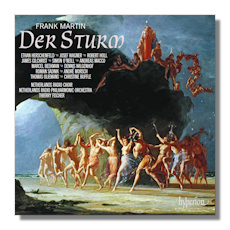
The Internet's Premier Classical Music Source
Related Links
- Martin Reviews
- Latest Reviews
- More Reviews
-
By Composer
-
Collections
DVD & Blu-ray
Books
Concert Reviews
Articles/Interviews
Software
Audio
Search Amazon
Recommended Links
Site News
 CD Review
CD Review
Frank Martin

Der Sturm (The Tempest)
- Christine Buffle, soprano (Miranda)
- Marcel Beekman, tenor (Adrian)
- James Gilchrist, tenor (Antonio)
- Simon O'Neill, tenor (Ferdinand)
- Roman Sadnik, tenor (Trinculo)
- André Morsch, baritone (Stephano)
- Thomas Oliemans, baritone (Bootsmann)
- Josef Wagner, baritone (Sebastian)
- Ethan Herschenfeld, bass (Alonso)
- Robert Holl, bass (Prospero)
- Andreas Macco, bass (Gonzalo, Ein Schiffspatron)
- Dennis Wilgenhof, bass (Caliban)
Netherlands Radio Choir
Netherlands Radio Philharmonic Orchestra/Thierry Fischer
Hyperion CDA67821/3
Frank Martin matured late as a composer. Only by the 1940's, when he was over 50 years of age, did his unique blend of French sonorities and dodecaphonic precision both satisfy his own standards and attract viable commissions for him. By 1953 Martin's Five Songs of Ariel was written using material from 30 years earlier. At the same time, the composer's abiding fascination with Shakespeare's Tempest led him to embark on a highly ambitious project, an opera embodying some of Martin's views of possible complementary roles of music and theatricality, based closely on the Renaissance drama – and using the highly thought-of but much earlier translation into German by August Wilhelm von Schlegel (1767-1845). After significant changes in principals, the work's première took place in June 1956 with the Vienna State Opera – the company's first contemporary work after its post-war re-opening in 1955.
That Vienna production was a huge success. The work was given in concert by the BBC in English under its original conductor, Ernest Ansermet; then again in a French translation in 1967 in Geneva. Then a strange neglect for decades, despite the relative popularity of Martin's Le vin erbé, which was actually intended for stage performance. There was an LP of extracts from Der Sturm on Deutsche Grammophon. But no full recording until this one, which is thus not only effectively the work's world première recording; it's also the first full-length live opera recording on Hyperion, hard though that is to believe. So expectations are high.
They are lived up to in every respect. In the first place, you'll be struck by Martin's distinct orchestration, redolent of Debussy and Ravel… lush, sonorous, tender, yet rich. Here the Netherlands Radio Philharmonic with Thierry Fischer more than adequately match the energy that such a palette of colors and textures implies. At the same time they support a cast of singers obviously committed too to Martin's vision. This is a three-CD set that anyone even remotely attracted to Frank Martin's music should not miss. As an important, though overlooked, milestone in twentieth century opera, and music of great beauty and impact, it's also one to get.
The ethereal and impressionistic timbres and use of suggestion, half-tones, barely lit tones, deceptive tones and nuances suit well a play as magical and mystical as The Tempest. Indeed, there are passages (in Act I, Scene 3, [CD.1 tr.4], for instance) when the writing is very close to that of Debussy's Pelleas. But that's not to say that Martin's writing is in any way derivative. It has its own structure, clarity, open gestures, equilibrium and stated purposes.
Der Sturm very cleverly captures the motifs of slightly submerged disdain, anger, intention for revenge and of the lesson that, when the latter becomes imperceptibly Prospero's intent to avenge, reconciliation. The only times when Martin's writing becomes in any way mechanical or self-conscious are one or two moments of surprise, and of Caliban's antics. But they're not overplayed. The Netherlands Radio Philharmonic, by taking them literally, keeps a real sense of proportion. If The Tempest is a whispered ode to the half-perceived (or perhaps the half-intended), to the "double take", to leading from behind, even to (the act of) renunciation itself, then it must be performed musically with the minimum of device – lest self-conscious spectacle or theatricality for its own sake (appear to) contradict the simplicity implied by the very transparency in which this score is so rich.
That's just what happens on this recording. There is no artifice in either singing or playing. Nothing is concealed, subsequently to be revealed as a trick, forcing you to reassess what you've just heard. The singers are lucid and giving. But not naïve. Above all, the whole cast of musicians on this recording draws the listener with them into the experience itself of shipwreck and magic, humility and power. Their style is immediate and warm, personal not iconic. Fully consonant with Shakespeare's own priorities, which must be what Martin wanted.
So one of the strengths of the team performing on this CD is a steady, plausible style of acting and singing which faithfully reproduces the genre ("Late Romance"), the innate philosophy revealing what it does about human nature, and both the dramaturgical "novelty" and the enduring dramaturgical endurance. These need both interpretative imagination and technical prowess. Fischer has the former and all those involved have the latter in abundance.
The acoustic (that of the Concertgebouw) and recording itself are atmospheric. They suit well the happily claustrophobic island that's "full of noises". There is an excellent and perceptive introductory essay in the accompanying booklet and the full texts in German with Shakespeare's original, so close to The Tempest was von Schlegel's libretto. The release of Der Sturm is a major recording event. It's very well done and makes a compelling and highly pleasurable experience.
Copyright © 2011, Mark Sealey.





















